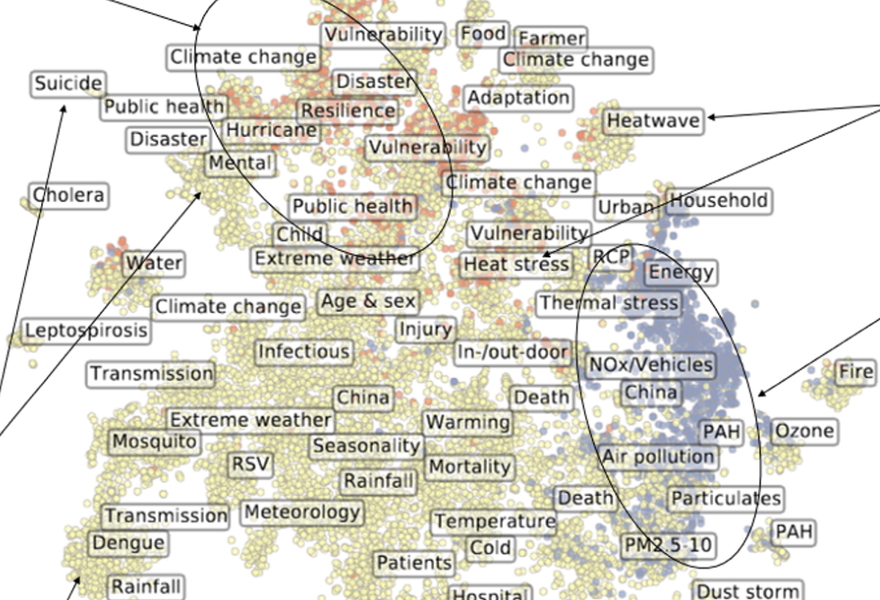Condensing the worldwide state of knowledge on “Climate and Health” from 16,000 studies
A project with MCC participation for the UK Foreign Office. Large research gaps on co-benefits and trade-offs still to be filled. Further research with focus on the Global South.

It indicates topic clusters, knowledge gaps, and interrelationships: the "Climate and Health" map. | Photo: MCC
Rising temperatures and precipitation increase the risk of malaria in many countries, drought endangers nutrition, and heat stress affects the circulatory and respiratory systems: it is clear that climate change makes people ill, but beyond such examples, what is known about its overall effect? What are the benefits, or possibly risks, to health when politicians take measures against global heating? From 16,000 individual studies, the state of knowledge has now been condensed more comprehensively than ever before, on behalf of the British Foreign Office and with the participation of the Berlin-based climate research institute MCC (Mercator Research Institute on Global Commons and Climate Change). The results have been published in the renowned journal The Lancet Planetary Health. The likewise prestigious journal Environmental Research Letters has published a further paper on the subject, with a focus on poorer countries.
The London School of Hygiene & Tropical Medicine and the University of Leeds were also involved. To deal with big data, the team of researchers used two well-established scientific methods. First, algorithms were trained with "supervised machine learning", mimicking human decisions, and eventually filtering out the 16,000 relevant studies from hundreds of thousands of publications. In a second step, these studies were then classified thematically with "unsupervised machine learning" and located on a scientific "map".
"We provide here a first meta-study for the comprehensive overview of research on 'Climate and Health', which is much more extensive than we previously suspected," says Jan Minx, head of the MCC working group Applied Sustainability Science and a co-author of the paper. "Such maps of knowledge are of utmost importance for assessments and policy advice. When developing policy solutions for climate protection, and additionally also for adaptation to climate change, health should always be borne in mind. We are now providing the starting point needed for this."
The map of climate and health research shows agglomerations ("clusters") of stresses (above all heat stress and air pollution), of health consequences (above all total mortality and infectious diseases), and of climate-related hazards (seasonality, extreme weather events, heat, weather fluctuations). There are glaring gaps in knowledge, for example, on how climate protection and adaptation support, or interfere with, each other in terms of health. With a view to policy solutions, the research team also scanned which topics most oftenly co-occur in studies, and for which topic interrelationships there is little knowledge. The origin of papers was also illuminating: it turns out that they stem disproportionately from rich industrialised countries and China.
A second research synthesis, which focuses on poorer countries, evaluates 99 relevant studies. It also systematically maps climate hazards, political measures, and effects on health. "What stands out is the lack of knowledge about the adaptation programmes that are frequently being launched in the Global South," says Max Callaghan, a postdoc at MCC. "It is where vulnerability is highest that we do too little to understand how to alleviate risks of climate impacts. Our work is providing recommendations to fill research gaps, and to make policy advice more robust as a result."
Reference of the cited articles:
- Berrang Ford, L., Sietsma; A., Callaghan, M., Minx, J., Scheelbeek, P., Haddaway, N., Haines, A., Dangour, A., 2021, Systematic mapping of global research on climate and health using machine learning, The Lancet Planetary Health
https://doi.org/10.1016/S2542-5196(21)00179-0 - Scheelbeek, P., Dangour, A., Jarmul, S., Turner, G., Sietsma, A., Minx, J., Callaghan, M., Ajibade, I., Austin, S., Biesbroek, R., Bowen, K., Chen, T., Davis, K., Ensor, T., Ford, J., Galappaththi, E., Joe, E., Musah-Surugu, I., Alverio, G., Schwerdtle, P., Pokharel, P., Salubi, E., Scarpa, G., Segnon, A., Siña, M., Templeman, S., Xu, J., Zavaleta-Cortijo, C., Berrang-Ford, L., 2021, The effects on public health of climate change adaptation responses: a systematic review of evidence from low- and middle-income countries, Environmental Research Letters
https://doi.org/10.1088/1748-9326/ac092c





